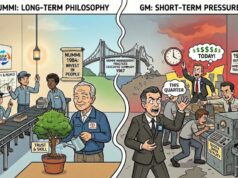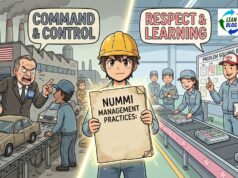Steven Spear is asked what makes a good TPS-style manager, he says it all comes down to problem solving.
“The team leader and group leader were capable of teaching these [problem solving] skills in a directed, learn-by-doing fashion, because they too were consistently trained in a similar fashion by their immediate senior. We found that in the best TPS-managed plants, there was a pathway of learning and teaching that cascaded from the most senior levels to the most junior. In effect, the needs of people directly touching the work determined the assistance, problem solving, and training activities of those more senior. This is a sharp contrast, in fact a near inversion, in terms of who works for whom when compared with the more traditional, centralized command and control system characterized by a downward diffusion of work orders and an upward reporting of work status.”
Reading about the GM management shakeup this week, with CEO Rick Wagoner also taking on the GM North America President responsibilities, the move was characterized as a way of “making sure all the decisions run through him” and to “shorten the lines of communication and decision-making” (Detroit News). For all the talk of GM copying Toyota at an operational level, the differences in management philosophies couldn't be more stark. At GM, information flows up, where the smart people up top make all the decisions apparently.
Does the TPS mentality that Spear describes flow all the way to the top? Is Toyota CEO Fujio Cho the “chief teacher” or the “chief decision maker”? Do both models have equal merit, does it depend on the situation, or is Toyota's model clearly better?
If you’re working to build a culture where people feel safe to speak up, solve problems, and improve every day, I’d be glad to help. Let’s talk about how to strengthen Psychological Safety and Continuous Improvement in your organization.








